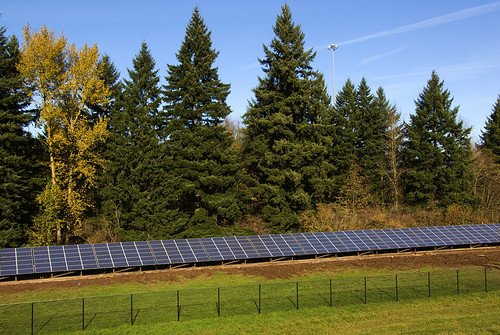Among the five, Oregon has been pioneering in its industrial construction and development in this field. It has developed a pilot solar-powered high way, the first of its kind in the nation, installed with a 104kW system comprised of 594 panels.
"Green means healthier learning environments for students and adults, plus lower energy costs and a stronger economy," said U.S. Secretary of Education Arne Duncan, also in a statement released this week. "Green programs of study support the administration's goal of expanding a green workforce by preparing students for high-skill, high-wage jobs in a clean energy economy.
Its annual production is about 128 megawatt-hours – enough to power about 10 typical homes for a year. However, The Oregon Dept of Transportation (ODOT) is using it to power the lights at the I-5 & I-205 exchange.

Meanwhile, earlier this month, Austin announced its pilot program called Sunflowers, An Electric Garden.
Designed by public art team Harries/Heder, the installation consists of 15 flower-like solar photovoltaic panels located on a pedestrian and bike path between the village of Mueller and Austin’s highway I-35.
 Global warming and decreased non-renewable energy resources have become the most crucial issues faced by human beings. While, secondary and post-secondary schools have started to pay attention to bring "green" to their program design, mainly focusing on cultivating future "green" engineers/technologists, however, "green" ideas are missed in most of the K-12 curricula. Additional content orientations in arts and aesthetics are mentioned a lot in the educational field, but the idea of applying "green" in daily life are not integrated into K-12 curricula as well as most teacher education programs. While we want our children to be knowledgeable, artistic, creative, critical, and thoughtful as individuals, we also want them to be aware of global and social issues: we really need to work hard to make our living places better, for ourselves and for the next generations.
Global warming and decreased non-renewable energy resources have become the most crucial issues faced by human beings. While, secondary and post-secondary schools have started to pay attention to bring "green" to their program design, mainly focusing on cultivating future "green" engineers/technologists, however, "green" ideas are missed in most of the K-12 curricula. Additional content orientations in arts and aesthetics are mentioned a lot in the educational field, but the idea of applying "green" in daily life are not integrated into K-12 curricula as well as most teacher education programs. While we want our children to be knowledgeable, artistic, creative, critical, and thoughtful as individuals, we also want them to be aware of global and social issues: we really need to work hard to make our living places better, for ourselves and for the next generations.



No comments:
Post a Comment